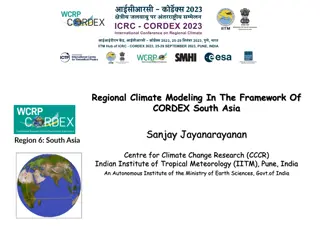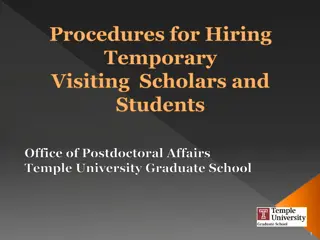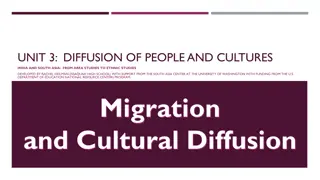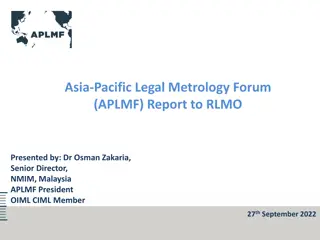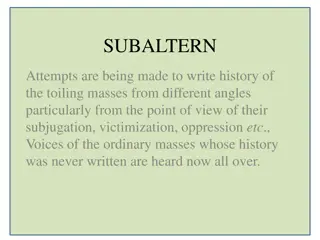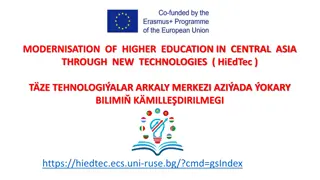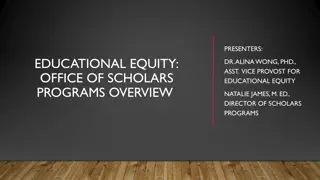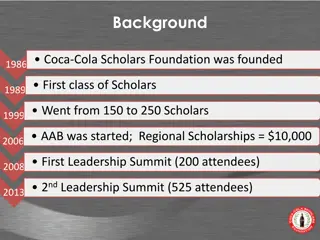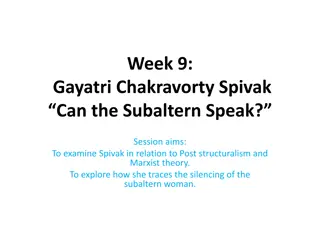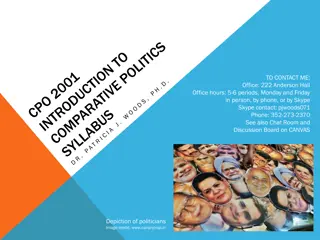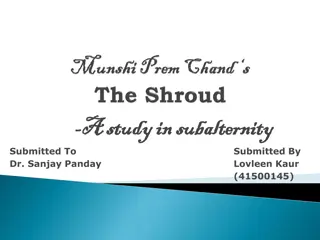The Subaltern Studies Group: Postcolonial Scholars in South Asia
The Subaltern Studies Group (SSG) is a collective of South Asian scholars exploring postcolonial and post-imperial societies, challenging traditional narratives and focusing on history from below. Influenced by Gramsci, the SSG emphasizes non-elites as agents of change in Indian history, critiquing conventional Marxist perspectives. Scholars like Ranajit Guha, Gayatri Spivak, and others have contributed to this critical discourse.
Download Presentation

Please find below an Image/Link to download the presentation.
The content on the website is provided AS IS for your information and personal use only. It may not be sold, licensed, or shared on other websites without obtaining consent from the author.If you encounter any issues during the download, it is possible that the publisher has removed the file from their server.
You are allowed to download the files provided on this website for personal or commercial use, subject to the condition that they are used lawfully. All files are the property of their respective owners.
The content on the website is provided AS IS for your information and personal use only. It may not be sold, licensed, or shared on other websites without obtaining consent from the author.
E N D
Presentation Transcript
SUBALTERN SCHOOL SUMAN PATRA ASSISTANT PROFESSOR DEPARTMENT OF HISTORY CHANDIDAS MAHAVIDYALAYA
Subaltern Studies The Subaltern Studies Group (SSG) or Subaltern Studies Collective is a group ofSouth Asian scholars interested in the postcolonial and post-imperial societies which started at theUniversity of Sussex in 1979 80. The term "subaltern" in this context is an allusion to the work of Italian MarxistAntonio Gramsci (1891 1937). The term's semantic range has evolved from its first usage by RanajitGuha, following Gramsci, to refer solely to peasants who had not been integrated into the industrial capitalist system. It now refers to any person or group of inferior rank or station, whether because of race, class, gender, sexual orientation, ethnicity, or religion.
FEATURES Their essentialist approachis one of history from below, focused more on what happens among the masses at the base levels of society than among the elite.
The SSG arose in the 1980s, influenced by the scholarship of Eric Stokes andRanajitGuha, to attempt to formulate a new narrative of the history of India and South Asia. This narrative strategy most clearly inspired by the writings of Gramsci was explicated in the writings of their "mentor" RanajitGuha, most clearly in his "manifesto" in Subaltern Studies I and also in his classic monograph The Elementary Aspects of Peasant Insurgency. Although they are, in a sense, on the left, they are very critical of the traditional Marxist narrative of Indian history, in which semi-feudal India was colonized by the British, became politicized, and earned itsindependence. In particular, they are critical of the focus of this narrative on the political consciousness of elites, who in turn inspire the masses to resistance and rebellion against the British. Instead, they focus on non-elites subalterns as agents of political and social change.
Scholars associated with Subaltern Studies include: RanajitGuha Eric Stokes David Arnold David Hardiman Dipesh Chakrabarty ParthaChatterjee Gyanendra Pandey Gyan Prakash SumitSarkar(later dissented) Gayatri ChakravortySpivak Gautam Bhadra Shahid Amin
Criticism One of the group's early contributors,SumitSarkar, later began to critique it. He entitled one of his essays "Decline of the Subaltern in Subaltern Studies", criticizing the turn to Foucauldian studies of power-knowledge that left behind many of the empiricist and Marxist efforts of the first two volumes of Subaltern Studies. He writes that the socialist inspiration behind the early volumes led to a greater impact in India itself, while the later volumes' focus on western discourse reified the subaltern-colonizer divide and then rose in prominence mainly in western academia. EvenGayatri Spivak, one of the most prominent names associated with the movement, has called herself a critic of "metropolitan post-colonialism".[6]


![READ⚡[PDF]✔ Emerging Space Powers: The New Space Programs of Asia, the Middle Ea](/thumb/21554/read-pdf-emerging-space-powers-the-new-space-programs-of-asia-the-middle-ea.jpg)
